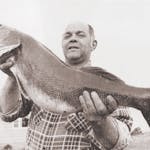 See
more of the story
See
more of the story
My big brother fancied himself a baseball hurler, a righthander with promise, when I was a kid in North Dakota. He threw heat, and to tighten the screws on his helter-skelter delivery, he drew a square using chalk on the brick wall of a neighborhood school and on weekends commanded me to stand about three feet in front of it, bat in hand, and "hit anything I could see."
For long hours during those training exercises, baseballs rained down on me like meteors, and with about as much accuracy. Years later the great Yogi Berra, the malapropism all-star, would famously opine that, "In baseball, you don't know nothing," an existential if not altogether nutty utterance that somehow made sense to me, the kid who passed his formative years perpetually bruised.
We were still kids, my brother and I, when our parents picked up and moved to Michigan.
The first thing you need to know about Michigan, as the prodigious Yankee shortstop Derek Jeter once said, especially about playing baseball in Michigan, is that it's really cold — a fact so particularly true in the Upper Peninsula, where our family landed, that the small school in our small town fielded no baseball squad.
Home plates, after all, are intended to be dusted off, not shoveled.
So it was that until my phone rang a couple weeks back with an invitation to toss the honorary first pitch Saturday night when the Twins play the Texas Rangers, I hadn't been thinking much about America's pastime.
Don't mistake, I'm a Twins fan. But the stats I pay attention to aren't those typically highlighted in the team's media guide. Joe Mauer, for instance, likes to shoot his bow, or so I've heard. The second baseman, Brian Dozier, grew up hunting and fishing, and still does both. And the club's hometown slugger, the big guy with the quick wrists and two World Series rings, Kent Hrbek, never waves off a sign telling him to bait up for walleyes or lock and load for ducks.
So, too, Ron Davis, the hard-throwing Yankee reliever who was traded to the Twins in 1982 in the deal that sent Roy Smalley to New York.
Davis' time with the Twins didn't go well. But he and I fished and hunted together some, and on the Mississippi between Monticello and Elk River he was a killer bass fisherman, and on his ranch near Waco, Texas, he and his 20-gauge could outdraw me every time when a covey of quail rose ahead of my English setter.
None of which will give me much help Saturday when I take the mound at Target Field and, winding up, attempt not to embarrass myself in front of untold thousands of hot dog-chomping baseball fans.
"Whatever you do, don't throw it in the dirt," my colleague Patrick Reusse warned. "They'll think you're a wuss."
I received the pitching invitation because Saturday is the 35th anniversary of the founding of Pheasants Forever (PF), the conservation group begun in St. Paul that is still headquartered here and that today boasts nearly 143,000 members and 745 chapters nationwide.
Fed up by the continual habitat losses that seemed to doom the ringneck's prospects in Minnesota and elsewhere, I had proposed the bird club idea in my column, which at the time was published in the rival sheet across the river.
An organization was needed to advocate for pheasants, I argued, and to lobby as well for a state upland restoration program to benefit not just those immigrant fowl but songbirds and other farmland wildlife, too.
Readers don't often send envelopes filled with cash to nutjob columnists. But many did then, saying, "Sign me up."
My friend Norb Berg was a key adviser throughout this process, and Jeff Finden, then the Pioneer Press national sales manager, would in time leave that job to become PF's first executive director. Wayzata lawyer Bob Larson was an early believer, too, and completed the legal work (pro bono) required to get the organization airborne.
But perhaps serendipity deserves the most credit in the group's early going. The timing was right, and after the initial PF fundraising banquet in St. Paul, chapters quickly formed in Kandiyohi, Stevens, Jackson and Stearns counties — and now 741 more.
Remarkably, since the group's first days, PF's volunteers have preserved and enhanced 8.5 million acres of habitat nationwide — and 256,000 acres in Minnesota.
On behalf of those citizen conservationists and their tireless efforts, I agreed to risk infamy Saturday night while attempting to toss a baseball more-or-less accurately in the air from mound to plate, a span of 60 feet, 6 inches.
Sounds easy enough.
But even a cursory online search (try "Mark Wahlberg and Red Sox," "the rapper 50 Cent and Mets" or "Obama and Nationals") confirms the obvious: Big leaguers possess skills the rest of us don't.
"I'd never do it myself," a friend told me when I ran the pitching idea by him. "But you should. I mean, what could go wrong?''
Dennis Anderson • 612-673-4424




